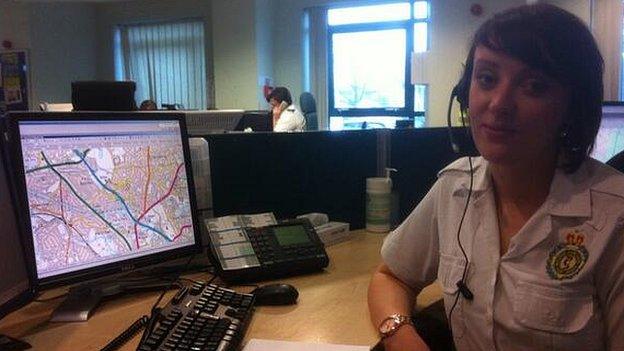Ambulances: A call centre worker on a busy job
- Published

On Tuesday, the BBC followed tweets put out by three busy ambulance call centres - North West Ambulance Service, West Midlands Ambulance Service and East of England Ambulance Service - under the #team999, external, giving a revealing snapshot of the high-pressure work of ambulance crews.
At the end of the day, we put a series of questions to Jess Parsons, a call handler for the West Midlands service.
Question: What was the biggest waste of time and what was the most rewarding in terms of cases?
Answer: Waste of time - either the chap who 'ordered' an ambulance earlier and didn't need it because 'the patient was just p****d' or perhaps the woman who at the bus station who hung up on me - we still needed to send a rapid response vehicle so that we could be sure: but we could have done it on the phone if she'd talked to me - obviously tied up a resource that could have been doing rather more.
Most rewarding - I would say the stroke case or the cardiac arrest.
Question: Do you ever manage to follow up on some cases that you wished to know more about?
Answer: Sometimes the crews will inform call centre staff, but once in hospital care we are unable to get individual updates
Question: Is it typical that falls account for a greater proportion of your calls than any other topic?
Answer: Falls make up for around 20% to 25% of our calls, though that can rise when it is icy.
While some of them can be simply people tripping over and injuring themselves eg a fractured hip, we need to be mindful that it is not because the patient has had a heart attack - or even a cardiac arrest.
Question: One of the featured tweets was about a man who was inebriated, external, what volume of calls would you say are completely inappropriate?
Answer: Clearly we get rather more alcohol related calls on a Friday and Saturday night for obvious reasons.
It is difficult to put an exact figure on how many calls are alcohol-related - we don't specifically record that as we often have no proof that it is alcohol that is the cause.
Some medical conditions produce a not dissimilar response from the patient eg head injuries often make patients very violent.
On a Saturday night is the patient aggressive because of booze or the head injury or both?
In regard to inappropriate, there are undoubtedly some calls that people should be accessing other parts of the NHS and that is why we think 111 has real potential as a way of signposting patients to the most appropriate place for the type of help they need.
We've just taken over the bulk of 111 in the West Midlands and this is an area we are working on really hard to help integrate the services much more closely.
Our statistics show that only about 10% of 999 calls are truly life threatening - our primary role. Roughly 90% to 95% will require some form of help from the NHS, just not necessarily the ambulance service.
Question: How pressurised would you say it is working in a call centre?
Answer: Pressurised is perhaps not the right word - it can be intense at times.
When it's really busy you need to give 100% to each call while being aware that there could be other people waiting to get through. Just need to be really focused on the job at hand.
Question: Are there times in the week that are busier than others? And times when it is quieter?
Answer: Friday and Saturday night into the following morning are particularly busy. The only 'Q' (we never say that word in the ambulance service) time is possibly in the early hours of a weekday morning, but even then it keeps ticking over.
Question: Some of the tweets were about working in public places, such as on a bus , external- how difficult is it for paramedics to carry out their work in such public situations?
Answer: At the end of the day, the staff get on and do what needs to be done. If possible we will always try and provide the patient with dignity whether that is clearing people away from the location or moving them onto the ambulance, but in the case of the very tragic incident on the bus, you don't have time to worry about that - every second counts in those situations and you just need to get on with providing the best care you possibly can.
Question: How often do you have to rely on interpreters to get vital information from callers who do not have English as a first language?
Answer: Not as often as you might think given the West Midlands is the second most ethnically diverse region in England.
The vast majority of people who call us use English and want to use English. We only need interpretation services about once every couple of shifts or so.
Question: One of the tweets featured a child who had swallowed a felt tip pen - is that unusual? Do you tend to get a spate of calls about children doing similar things from time to time as a result of crazes?
Answer: You'd be surprised how often children stick a whole variety of items into their ears, nose and mouth!
Crazes don't usually have an effect on 999 calls, but school holidays do - not sure whether they are bored or just experimenting.
- Published18 March 2014